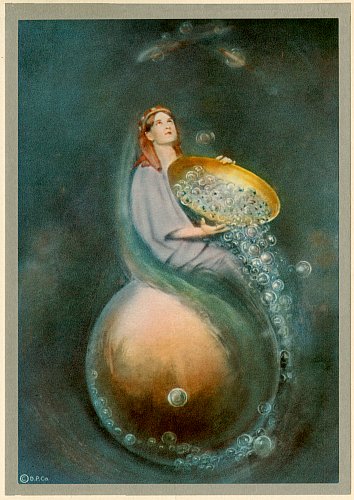December 2007
This Month's Contents: Soap Bubbles by Paul Constant | Poetry by Bob Harwood | The Business of Seeking by Shawn Nevins | Excerpts by Douglas Harding | Video - Clive Wearing | Humor
Editor's Note
by Shawn Nevins
 If you don't know where you've been, how will you know where you're going? How
many of us can look back over the past year and identify the eddies in which we
are stuck—the little zones of comfort where we hide and think "tomorrow" or
"when I'm ready" or "if only." Tonight, be alone. Walk outside and look up at
the night sky, for looking deeply without is the same as looking deeply within.
Maybe, just maybe you will step into the roaring inside you and determine not to
be Rikei's "sad twilight cricket."
If you don't know where you've been, how will you know where you're going? How
many of us can look back over the past year and identify the eddies in which we
are stuck—the little zones of comfort where we hide and think "tomorrow" or
"when I'm ready" or "if only." Tonight, be alone. Walk outside and look up at
the night sky, for looking deeply without is the same as looking deeply within.
Maybe, just maybe you will step into the roaring inside you and determine not to
be Rikei's "sad twilight cricket."
Sad twilight cricket ...
Yes, I have wasted
Once again
Those daylight hours.
Soap Bubbles, by Paul Constant
For a moment, in your mind, picture an image of a floating soap bubble. Outside of this special bubble, everything ostensibly stretches to infinity. On the inside, nothing exists, but this Nothingness is unlike anything the mind can comprehend.
The bubble perseveres because the thin film sustains itself through a delicate
balance of tension across the film and between the pressure on the inside and the
outside. Upon closer examination, this film reveals a vibrant color dance, flowing
to and fro, varying across the color spectrum as the filmy substance shifts randomly
around the bubble's circumference.

In many regards, the world as we experience it is like the soapy film. Our individual mind, residing in a multitude of opposing forces—good and bad, positive and negative, light and dark—maintains itself through a system of life-tension. It witnesses the stimulating activity of everything reflected on itself, falsely believing that everything exists as a thing apart but not understanding that the mind-substance is the very medium of the reflection. Convincingly, all apparent life forms seem to be in agreement concerning most qualities of the bubble film. The "dancing colors" even give the illusion of movement across space, which in turn produces the illusion of time. In some cases, the human mind is vaguely aware of the interior Nothingness, but it is addicted to the color dance, which grips it with a seemingly endless buzz of activity. In truth, the mind is unaware of its thin delicate position at the half-way point between Nothingness and Everythingness.
In rare instances, a "seeker-mind" intuits the finite qualities of the bubble film. It exerts Herculean effort, stretching to grasp the bubble-center that incessantly exudes a homecoming call, a longing tug. Stretching inward, the mind senses something watching it—a transitional area of awareness that lays between the incomprehensible Nothingness and the observable mind activity. The seeker-mind does not yet recognize the true Source of the awareness. One day, inexplicably, the inward stretching overcomes the tension and the bubble pops in an instant. And in that instant, Nothing and Everything merge and become a boundless One.
Just as inexplicably, the bubble-mind reasserts itself, but now it recognizes a single Source of awareness. This Experienced mind retains a memory but cannot plausibly expound upon the boundless Nothingness that encompasses All. Ah, if only words could describe such a paradox to those who remain enamored with the mind realm…
~ For more essays and articles by Paul Constant, visit SearchWithin.org.
A Poem by Bob Harwood
|
"You Can't Hide From Me" You can't hide from me now, God, I admit, you used to fool me, In the past I often mistook the touch of a brushed sleeve, Nevertheless, I never stopped trying to find you, I kept looking for you, God, You must have felt sorry for me, When you revealed yourself, After that day, even though I couldn't always see you, Finally my persistence paid off, There's no need to waste anymore time It was a good joke, God, My eyes are glued to you, I'm sorry to spoil your fun, God, |
The Business of Seeking, by Shawn Nevins
Good to Great by Jim Collins is one of hundreds of business books published each year, probably as many as self-help/psychology titles. Most of them fade away, a few become best sellers, and even fewer become classics. I think Good to Great is a solid, fact-finding book with broad implications. Collins and his team researched all the Fortune 500 companies in existence from 1965 to 1995 to answer this: why some companies make the leap [from good to great]… and others don't. The leap from good to great is also what distinguishes the majority of spiritual seekers from those that find lasting success.
Without delving into his criteria, it suffices to say he found 11 out of 1435 companies that went from good to great. That's rare air, less than one percent. Collins' conclusions as to why these 11 companies went from good to great make intriguing parallels with the spiritual path. Not all of the conclusions apply to a spiritual life, but most do. As my intent is not to review Collins' work, I will only present those traits I find pertinent to a spiritual search.
1. Level 5 Leadership: "Level 5 leaders embody a paradoxical mix of personal humility and professional will." This is the same concept as Richard Rose's humble ego-less vector -- the determined person who no longer works for hope of personal gain. In fact, Rose used the analogy of a successful executive nearly twenty years before Collins' book:
An executive of a giant corporation succeeds, when he has risen above the desire for success and the fear of failure…. He grows into a creature that can move without desire, and make decisions without fear… while caring little about the whole operation. And while caring little he continues his task, knowing that everything will go the right way. – Direct Mind Experience
Collins makes another key discovery regarding leadership: "Level 5 leaders look out the window to apportion credit to factors outside themselves when things go well. At the same time, they look in the mirror to apportion responsibility, never blaming bad luck when things go poorly." This is as example of Rose's concept of between-ness. It can be expressed as the power of thankfulness as well. Taking responsibility keeps us working, while giving away the credit keeps our ego from destroying the magic.
Level 5 leaders lead the way in developing the next four traits.
2. Confront the brutal facts: "When you start with an honest and diligent effort to determine the truth of your situation, the right decisions often become self-evident." If a person would truly admit their present circumstance, their search would be over in that moment. A lot of fence-straddling would end if we would admit our complete ignorance about our selves and life. What would make more sense than to dedicate our lives to finding our true nature? Confronting the brutal facts is equivalent to developing self- honesty. "Become the truth," as Rose advised. Self-honesty and persistence are, I believe, the two fundamental traits for spiritual success.
3. The Hedgehog: "The good-to-great companies are more like hedgehogs – simple, dowdy creatures that know 'one big thing' and stick to it. The comparison companies are more like foxes – crafty, cunning creatures that know many things yet lack consistency." Again, I quote Richard Rose: "Even as we study the man who was unable to finish [building] a shed, we may discover that some of his frustration may have resulted from his having too many irons in the fire."
4. Discipline: "The single most important form of discipline for sustained results is fanatical adherence to the Hedgehog Concept and the willingness to shun opportunities that fall outside the three circles." Discipline is a further elaboration of the Hedgehog in my mind and can also be called persistence. The idea of ignoring opportunities (distractions) is critical. Rose once said, "It's not so much what I did as what I didn't do," when speaking of his success on the spiritual path. He didn't fall prey to lesser amazements.
5. The Flywheel: "Good to great comes about by a cumulative process – step by step, action by action, decision by decision, turn by turn of the flywheel – that adds up to sustained and spectacular results." The flywheel is seen in retrospect. It is the way we use the moments of our day that determines our direction in life. No single muscular effort, no hard-sought technique, no one guru will flash the pan and bring us an answer. The daily prayer we make with our actions is what brings us luck.
Collins paints an unglamorous yet powerful portrait of the qualities that lead a business from good to great. These qualities apply to an individual, as well. An honest, persistent, focused, thankful person, moving step-by-step, and following a single goal is perhaps a daunting vision, yet Collins believes many people have the ability to develop into Level 5 leaders:
Whether or not we make it all the way to Level 5, it is worth the effort. For like all basic truths about what is best in human beings, when we catch a glimpse of that truth, we know that our own lives and all that we touch will be the better for the effort.
How true. I leave you with a final parallel thought from Richard Rose:
What good is it to lead a life or follow a system if you're not sure of making the whole trip and finding out the secret of everything?
Now the answer to that is that there is common sense in Zen. And the longer that you follow the self-confrontation, the self-analysis, the better off you are to just live with yourself, and for other people to live with you…. And you take a new, broader view of things because your egos are not in the way, destroying your friendships, and destroying your family, your financial possibilities even. – "Zen and Common Sense"
Excerpts from Douglas Harding
|
|
We have to go through the stage of discovering and being responsible for our unique selves. But if that's the whole of the story, gosh I'm in deep trouble, because that little one separates me from all beings. That face-thing in the mirror is my certificate of loneliness, of meaninglessness, because a world consisting only of things is meaningless. Love has no place there. Freedom has no place. It's a world where each is celebrating its own separate individuality - a recipe for hell. Hell says, "Keep out! I've got enough problems of my own." The guy in the mirror is the wrong way round. That's why I can't put him on Here. He turns his back to the world. He says, "I've got enough problems of my own, thank you very much." When I identify with that, I'm in effect saying, "I don't want to know your problems." But Who I really am Here, the First Person, cannot turn his back on the world. He faces the world. This is why we resist our First-Personhood. We have a feeling that to see Who we really are is to take on the suffering of the world - and the joy of the world - what there is of it. - From Face to No-Face by Douglas Harding. Visit The Headless Way for more. |
Clive Wearing -- A Case of Extreme Amnesia
If you don't see a video clip above, then go directly to YouTube.
Humor....A guy joins a monastery and takes a vow of silence: He's allowed to say two words every seven years. After the first seven years, the elders bring him in and ask for his two words. "Cold floors," he says. Seven more years pass. They bring him back in and ask for his two words. "Bad food," he says. Seven more years pass. They bring him in for his two words. "I quit," he says. "That's fine," the elders say. "You have done nothing but complain since you got here." ~ From an AIG advertisement |



